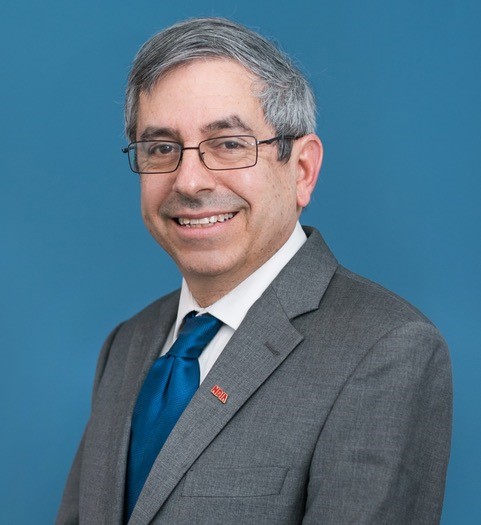Mark J. Lewis — Lecture
| Event Date: | March 11, 2021 |
|---|---|
| Speaker: | Mark J. Lewis | Executive Director of NDIA's Emerging Technologies Institute (NDIA ETI) |
| Speaker Affiliation: | NDIAETI.org |
| Time: | 1:15-2:15 PM EST |
| Location: | WebEx |
| Contact Name: | Maria Longoria-Littleton |
| Contact Phone: | +1 765 49-40015 |
| Contact Email: | mlongori@purdue.edu |
| Priority: | Yes |
| School or Program: | College of Engineering |
| College Calendar: | Show |
Emerging Technologies and the Future of National Defense
Abstract:
Since the earliest days of our nation, staying at the forefront of technological progress has been essential to America’s national security. In this second decade of the 21st century, the U.S. military finds itself at a critical juncture, where defense-relevant technology development is being driven more and more by the commercial sector; at the same time, other nations—including peer competitors—are investing in cutting-edge technologies at unprecedented levels, often building on American invention but deploying at a remarkable pace. This talk will address the current state of defense-related technology development and deployment, with an eye towards several key areas including microelectronics, artificial intelligence, space, directed energy, and hypersonics. The example of hypersonics as a technology area in which the United States was the clear inventor, but is now playing catch-up, will be highlighted, with an overview of recent progress and recommended paths forward.
Biography:
Dr. Mark J. Lewis is the Executive Director of NDIA’s Emerging Technologies Institute (ETI), a non-partisan think tank focused on technologies that are critical to the future of national defense. ETI provides research and analyses to inform the development and integration of emerging technologies into the defense industrial base.
Prior to this position, Dr. Lewis was the Director of Defense Research and Engineering in the Department of Defense, overseeing technology modernization for all Services and DOD Agencies, as well as the acting Deputy Undersecretary of Defense for Research & Engineering. In that role he was the Pentagon’s senior-most scientist, managing a $17B budget that included DARPA, the Missile Defense Agency, the Defense Innovation Unit, the Space Development Agency, as well as the Federally-funded Research and Development Centers, and the department’s basic and applied research portfolio.
From 2012 to 2019, Dr. Lewis was the Director of the Science and Technology Policy Institute, a Federally-Funded Research and Development Center that supported the Executive Office of the President and other Executive Branch agencies in the formulation of national science and technology policy. Dr. Lewis is a professor emeritus at the University of Maryland, where he served as the Willis Young, Jr. Professor and Chair of the Department of Aerospace Engineering until 2012. A faculty member at Maryland for 25 years, Dr Lewis taught and conducted basic and applied research in the fields of hypersonic aerodynamics, advanced propulsion, space vehicle design and optimization. Best known for his work in hypersonics, Dr. Lewis’s research has spanned the aerospace flight spectrum from the analysis of conventional jet engines to entry into planetary atmospheres. From 2004 to 2008, Dr. Lewis was the Chief Scientist of the U.S. Air Force, the principal scientific adviser to the Chief of Staff and Secretary of the Air Force. As the longest-serving Chief Scientist in Air Force history, his primary areas of focus included hypersonics, space launch, energy, sustainment, advanced propulsion, basic research, and workforce development. From 2010 to 2011 he was President of the American Institute of Aeronautics and Astronautics.
Dr Lewis attended the Massachusetts Institute of Technology, where he received his Bachelor of Science in aeronautics and astronautics, Bachelor of Science in earth and planetary science (1984), Master of Science (1985) and Doctor of Science (1988) in aeronautics and astronautics. He is the author of more than 320 publications, and has been adviser to more than 60 graduate students. In addition, he has served on various boards for NASA and the DOD, including two terms on the Air Force Scientific Advisory Board.
A recipient of the USAF’s Exemplary, Meritorious, and Exceptional Civilian Service Awards, and the Secretary of Defense Outstanding Public Service Award, Dr. Lewis was also the 1994 AIAA National Capital Young Scientist/Engineer of the Year, received the IECEC/AIAA Lifetime Achievement Award, the AIAA Dryden Lectureship, the AFA Theodore von Karman Award, and is an Aviation Week and Space Technology Laureate. He is a member of the International Academy of Astronautics, a Fellow of the American Society of Mechanical Engineers, a Fellow of the Royal Aeronautical Society, and an Honorary Fellow of the American Institute of Aeronautics and Astronautics.
Personal website and biography
Hosted by School of Aeronautics and Astronautics

